Muppetry of the Penis: Review of Lisa's Sex Strike
Reviewed by Christian M. Billing
Department of Music and Drama, University of Hull
Northern Broadsides' Lisa's Sex Strike was produced by Northern Broadsides in association with the Octagon Theatre, Bolton, UK. Directed by Conrad Nelson, the show toured to twelve English venues over a thirteen weeks period from 6th September to 30th November 2007. This review is based on a performance that took place on Friday 28th September. The Viaduct Theatre is the company's home venue, located in the converted cellarage of a Victorian Cloth Mill in Dean Clough, Halifax. The stage is minimal: set on a flagstone and concrete floor, its traverse playing area has low-vaulted ceilings and is adorned with exposed architectural ironwork. Technical paraphernalia are of necessity kept to a minimum and the relationship between actors and audience are held paramount. Performers act at spitting distance from spectators who are often bathed in the same light. All on-stage action takes place on a seven by twelve metre playing space with no possibilities for flying, trucking or trap-work.
Jessica Worrall's set is a well-worked exercise in touring economy. At one end of the traverse stage is located a raised platform. Towards the back of this small playing space is a cage made up of industrial site barriers, adorned with COSH signs that further the industrial feel. Inside the cage there is a tiny acting area, at the back of which hang banners (in the form of old-fashioned street maps) concealing an entrance and exit point. Above the cage sits a 1970s-style illuminated cinema sign, which encloses a high gallery. The sign bears the words '[P]RUTTS DREAM PARTS', together with the slogan: 'Come work at Prutt's; I'll pay you a bonus. Men earn good bread by pleasing their owners.' On the small raised platform below (and in the main playing space beyond) numerous cardboard boxes are scattered. At the opposite end of the traverse, two further sets of street-map banners hang. Each map bears a slightly off-angle red cross across its surface, evoking the flag of St George. Between the banners, a wide gap leads to a vaulted off-stage arch in which numerous musical instruments stand. These are produced and played by various members of the cast at different moments of what is a very musical performance.
As the show begins, a multi-racial group of six male actors enters in pristine white overalls. One of them, a white one, plays a melancholy trumpet voluntary while the rest hum chords beneath it. Vocal narration takes over from trumpet and, like preachers speaking over a subdued musical chorus, the men pass each other the task of describing the decline of their Northern English town... until Prutt came and set up shop! For now, not only do the town's indigenous multi-racial inhabitants find gainful employment, but also Eastern European migrants make their livings manufacturing Prutt's products. The men are so happy to have jobs that they do not ask what it is, exactly, that they make:
As to what we make here I don't give a toss.
Who the buyer is and what it's used for.
I know I'm earning; I don't want to know no more...
When a ball is thrown from the open traverse end, actors rip off their overalls and erupt into an impromptu football match.
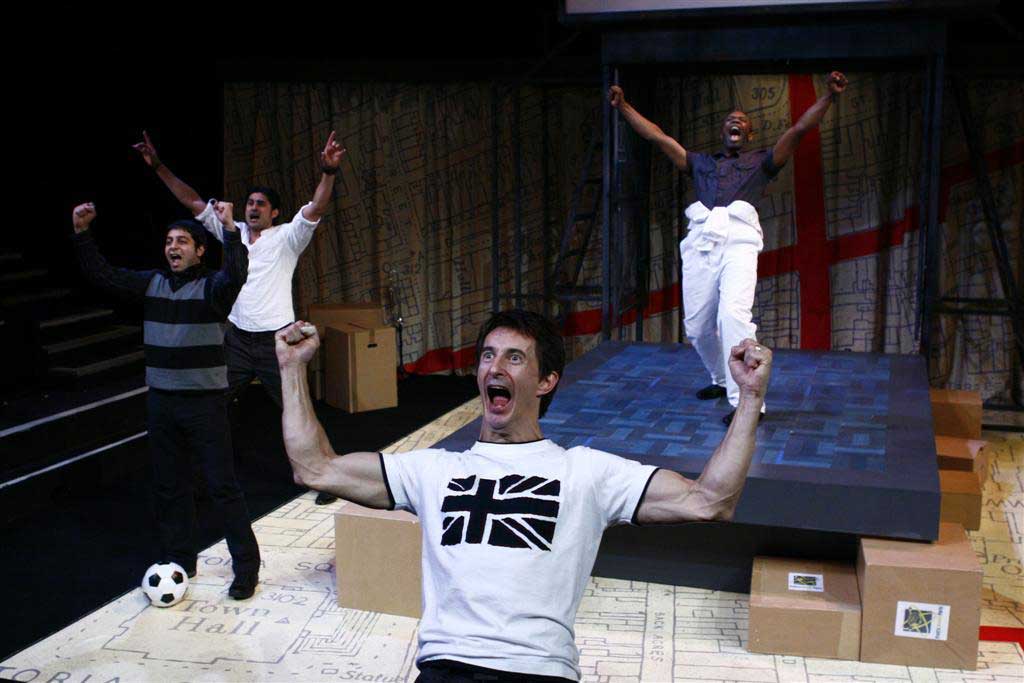 |
Plate 1 Football Match.
Copyright Nobby Clark 2007.
Nelson's choreography here is impeccable: performers, in a confined space, pass swiftly to heads, chests and feet, speaking rhyming couplets that underscore a dramatic move from harmony to discord. The physicality of the performance is well rehearsed and impressive; in an updated context, it works well as a modern spin on the formalised dancing of an ancient Greek chorus. More than visual spectacle, however, the soccer choreography has a political purpose: when an opportunity for sport arises, these workers align themselves in racially-divided teams, hinting at the fact that the apparent unity brought about by class solidarity in a time of economic growth is more fragile than at first it seems. Blacks and Asians versus whites, and in language that echoes the shocking confrontations of Tony Harrison's notorious poem 'V.', amid the sort of football chants that one can still hear on he terraces of some British stadia, racist jibes erupt:
WHITE(S)
When England won, in sixty-six.
We used our heads, we used our dicks,
Banks and Armfield, Stiles and Ball.
We didn't use no blacks at all.
BLACK(S)
Caspers, Rednecks, honkies, whites,
We're Robinho, you're pure shite.
WHITES
Nignogs, Pakis, ragheads, coons,
We're John Terry, you're baboons...
Finally, under his breath (and barely audible to his audience), one (white) player calls another (Asian) the 'son of an ugly backstreet whore.' Centre-stage, the Asian responds with a violent re-enactment of Zinedine Zidane's 2006, World-Cup-Final head-butt. It is shocking, but the audience hardly have time to be appalled at the rapid disintegration from class unity to racial disorder, as Lysistrata enters and takes the play from a present imperfect of racial hatred to a mythical past of Classical allusion:
I'm Lysistrata, Lisa for short,
A leader of women, or so I thought.
MALE CHORUS
Leda? Weren't she the one got screwed by Zeus
Disguised as a swan? If that's what you want from us
We're happy to assist...
Ignoring the macho jibes, Lisa (Becky Hindley) is quickly joined by Carol (Sally Carman) a pink-swathed, platform-shoe-tottering, good-time girl armed with a copy of Heat magazine and more than any girl's fair share of sexual sassiness and erotic innuendo.
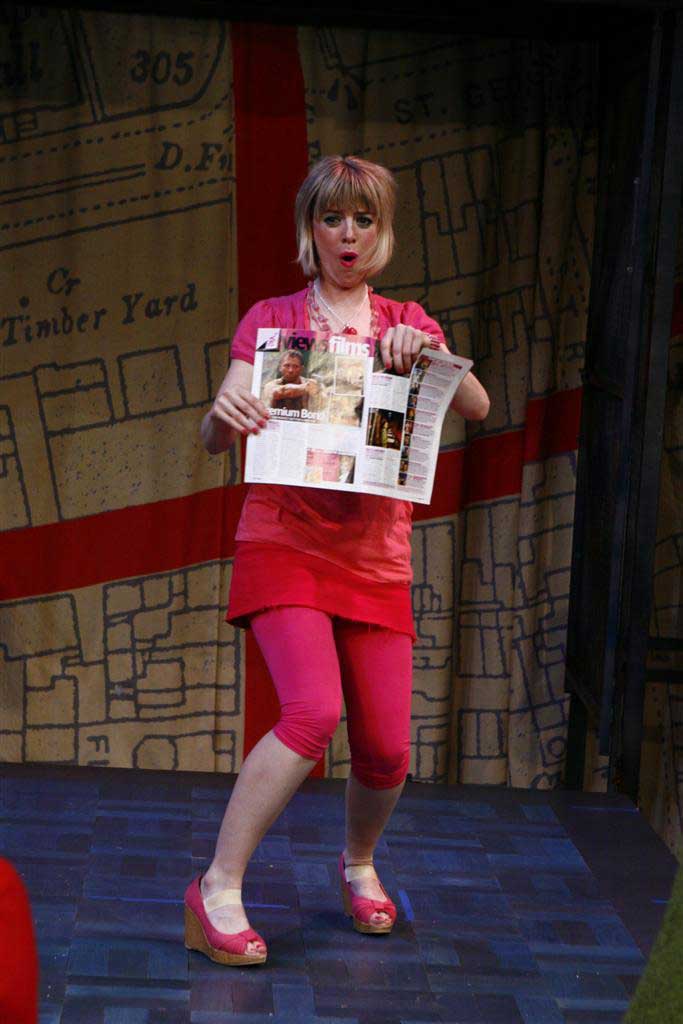 |
Plate 2 Carol.
Copyright Nobby Clark 2007.
As more women appear on stage, an immediate transformation from male prejudice to female compassion is not forthcoming. All but Lisa of the women reveal themselves to be just as racially prejudiced as their men—for the violence of this version of Lysistrata is not the Peloponnesian Wars, but the racial bigotry of modern England. This decision to update the background of Aristophanes's piece from antique inter-Hellenic conflict to current inter-racial prejudice (and its concomitant violence) is both brave and successful. As a company who make a point of playing, for the most part, to a clearly defined Northern English audience, the importance of such a decision cannot be overstated. Recent resurgences of the British National Party in the English North (and election successes for its racist policies in many of the areas to which this production tours) make the issues with which Morrison's script deals very near the knuckle in a number of venues. When Lisa observes: 'The other week they set a house alight' and Carol replies: 'Whatever. There were only Pakis in it...', or the latter claims that she does not care 'if the curry house had a brick through its window [...] so long as they keep serving bhaji bindhi'... such opinions may seem shocking and extreme to the readers of this review (ensconced as they probably are in the comfortable world of liberal middle-class academia), but to many in the audiences of Northern Broadsides production, such views may be heard, are deeply felt, and are uttered daily in workplaces, at bus stops and perhaps even in audience members' own homes. To confront them is not only brave, it is necessary.
Lysistrata's women claim that, as a result of incessant preoccupation with racial hatred, their men hardly have time to have sex. One complains: 'Every man in town's turned traitor / I've been thinking of buying a vibrator [...]'. Eventually, with much cajoling from Lisa, the women agree to join across racial divides in order to deprive their men of sex and, simultaneously, drive them wild by dressing and acting as provocatively as they can:
It is our duty to use
Every weapon we have [...]
Stockings, suspenders, wonderbras, thongs,
Boned basques with underwired cups, frilly babydolls,
Baroque bustiers, chemises with frou-frou ruffles -
Playing the vamp might be a cliché,
But once the men see us, it won't be war they want, no way!
The inclusion of this litany of erotic lingerie, employed by women to pacifist ends, raises interesting questions regarding the marriage of sexually-provocative clothing to feminist intent. The men of this play are to be tempted and frustrated by a display of flesh clad in the stereotypical trappings of modern erotica; but given that such images may be seen ubiquitously in the Western World on television, in magazines, on immense advertising billboards, in university classrooms, sometimes in the workplace, certainly in the pubs and clubs of many towns and cities, how are men (who are notoriously mono-logical when sexually aroused) supposed to differentiate between these radically different deployments? And what has happened to make feminists see them as legitimate tools in the struggle for gender equality? In the 1970s and 80s they would have defaced such images with spray cans pulled from their denim dungarees. Swearing an oath on Heat magazine the women declare with meta-theatrical glee: 'Ooh! It's just like a play by Aristophanes!' Given the radical differences between gender politics in the Classical period and in our own, it most certainly is not.
If the premise of denying men sex was enough to amuse the audiences of 5th-century Greece, however, it is inadequate for this version set in modern Britain, in which all-too-many unmanly men get on perfectly well without sexual favours from women:
[...] men who make war
Not love cos they can't get it up any more,
Drunks, nerds, gamblers, stamp collectors, golf freaks,
Trainspotters, vegplotters, computer geeks,
Men who'll not complain but actually thank us,
Gays, ladyboys, transvesites, porn addicts,
And all the castrati who care nowt for our charms.
If we're going to stop them taking up arms,
The whole lot of them have to be our targets.
We need to hit all the men, where it hurts.
As the women try to think of 'summat that men rate more than sex...' the voice of a goddess wafts into the theatre and an answer is mysteriously provided as the production makes one of a number of shifts of register. Moving from sex to money (for as Caryl Churchill has said: 'you can't separate economics and fucking...'), the stage is invaded by a Greek goddess: Mama Pax (Eve Polycarpou), who scoots around on a hippy-dippy, rainbow- and peace-slogan-bedecked disability scooter while male singers (who also play dulcimer, violin, trumpet, accordion, double bass, snare drum and cymbal) underscore her song.
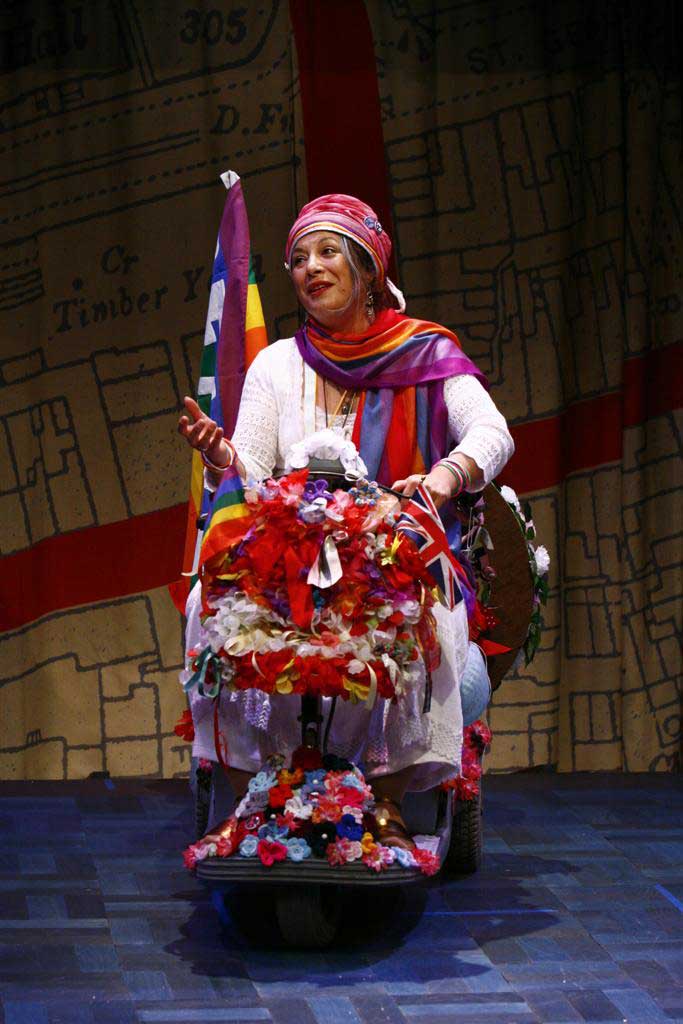 |
Plate 3 Mama Pax.
Copyright Nobby Clark 2007.
To a lilting Middle Eastern melody, female actors dance a Debka as Mamma Pax scoots and sings about the gender-political subtleties of peace protesting in the modern world. Her female chorus respond:
We salute you Mama Pax, dear,
You're a deity who knows her stuff:
To stop the men from brawling
Don't just hit them in the bollocks
We must also squeeze their wallets
So the cash that buys them weapons
Is cut off [...]
As the song ends, Lisa and her crew take flowers, peace flags and a pink-and-white CND-logo-shaped wreath from Mama Pax's chariot and put them on the cage representing Prutt's factory (in a representation of imminent occupation). As they do so (and as is so often the case in this production), the mood of the performance (currently one of peace and love) is rudely interrupted by a deliberately-upstaging and undercutting theatrical entrance. This time, the founder and artistic director of Northern Broadsides, Barrie Rutter, enters to perform a cameo as Old Man Mars.
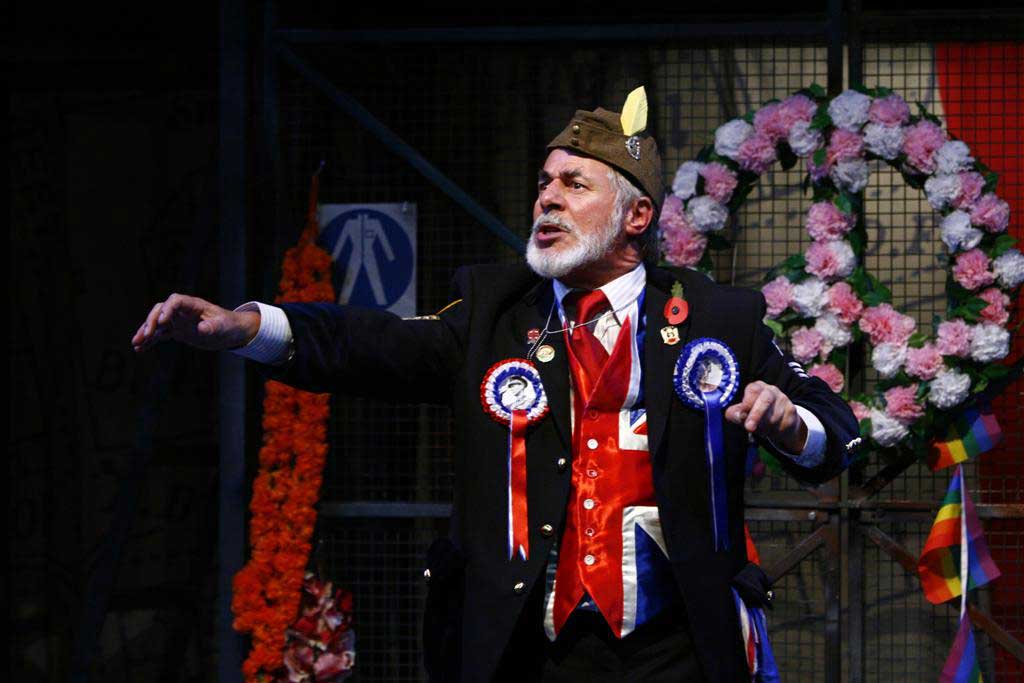 |
Plate 4 Old Man Mars.
Copyright Nobby Clark 2007.
Rutter's performance begins with a virtuoso song to the military two-step—a number that has the audience in fits and includes, in no particular order, the greatest campaigns of military history:
When the Romans trounced the Trojans, I were there
When the Prussians whipped the Russians, I were there
When the Chinese launched their army
Like a massive red tsunami
I were there, I were there, I were there.
When the white rose trashed the red rose, I were there
And Nero's heroes came to zero, I were there
When Maggie Thatcher bashed the Argies
And Bush and Blair bombed the Iraqis
I were there, I were there, I were there [...]
As Rutter's song reaches its conclusion, male members of the cast (who have been backing both Pax and Mars during their songs) begin to hum the Dambusters march and, abandoning their instruments so that they can hold out arms like schoolboys pretending to be bomber pilots, they do a flypast of Old Man Mars—who lobs imaginary grenades in the air and voices explosions as they wheel past him. The scene is a coup de théâtre, not only because of its sheer exuberance, but because it deploys ironically all of the joyous innocence of small boys playing at war games—begging the question as to why we still need to gender play thus, or clothe our youthful amusements in bellicose borrowings? For what are the chances of an end to war if boys are given guns, play with toy soldiers from an early age, and see films and television programmes that depict conflict as series of Boys' Own style valorous escapades? Following his song, Mars in a Union-Jack waist-coat, delivers a forty-one-line monologue in which he celebrates battle and bemoans the lot of the plain soldier. Much is made in this speech of recent debate in England concerning the poor technological and financial support being given to 'our brave boys abroad'. Finally, Mars takes on Mamma Pax in a battle of 'ancient gods with Alzheimer's' during which excellent use is made of post 5th-century battles.
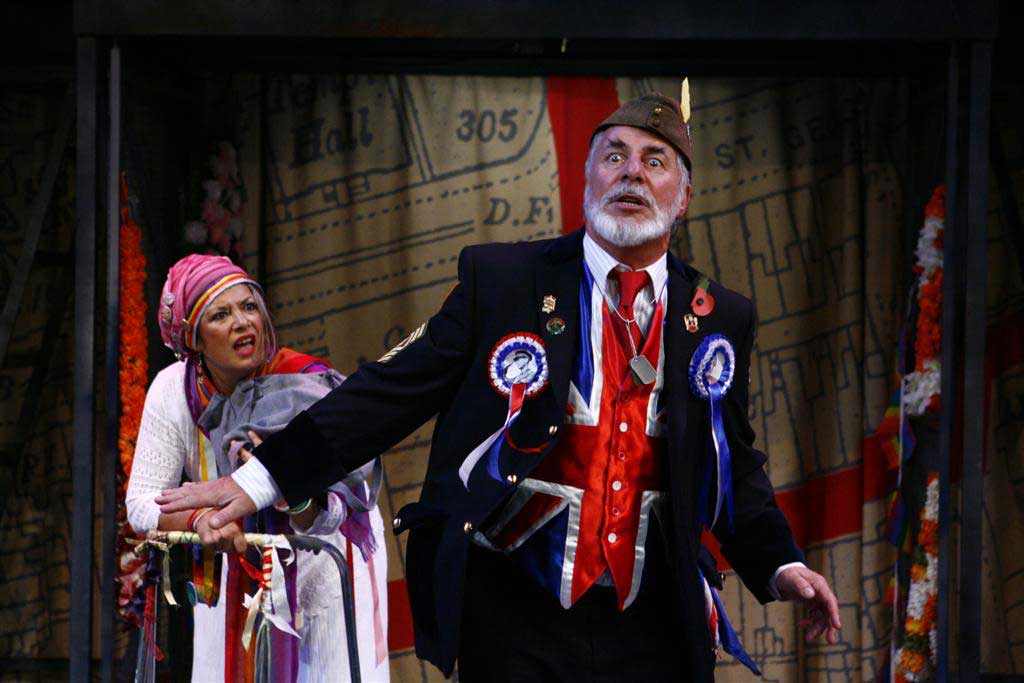 |
Plate 5 Mars and Pax.
Copyright Nobby Clark 2007.
As Mars gets increasingly excited, he becomes more and more mixed up in his accounts of military history:
OLD MAN MARS
I remember when I toppled Genghis Kahn and General Franco,
When he invaded Lindisfarne.
MAMA PAX
I'm afraid you're losing your memory,
As I recall, war's about death not glory,
About men dying for no reason
And their wives or mothers or daughters keening
Over their corpses and me - Pax, Eirene -
Helpless to console them.
OLD MAN MARS
Mussolini,
I trounced him too in the Boer war
And in 1918, the year before,
I killed Canute.
MAMA PAX
It's sad old timers
Like you who cause war [...]
OLD MAN MARS
And Bin Laden at Bosworth Field, and Sadaam Hussein
At Trafalgar - all trounced again and again
MAMA PAX
You've lost your marbles, you doddering idiot.
Give me that bomb before you do something daft with it.
OLD MAN MARS
And Napoleon in '45: all dead!
MAMA PAX
Shh, you're like a baby with a comfort blanket
That wants cuddling and putting to bed [...]
When Mama Pax and Old Man Mars exit, the perspective of the playing space once again shifts and the audience realise that the female actors occupying the central playing space are now inside the Acropolis (in this production, the shop floor of Prutt's factory). Filled with intrigue to find out what their husbands make, the women open boxes. Inside, they find the components of assault rifles and Apache helicopters 'the nuts and bolts of murder'. As her sisters discover more and more horrors with flabbergasted incredulity, Carol climbs the cage end of the stage and, standing in the gallery behind the cinema signage, transforms its letters (via a series of anagrams) into PRUTTS ARMS TRADE.
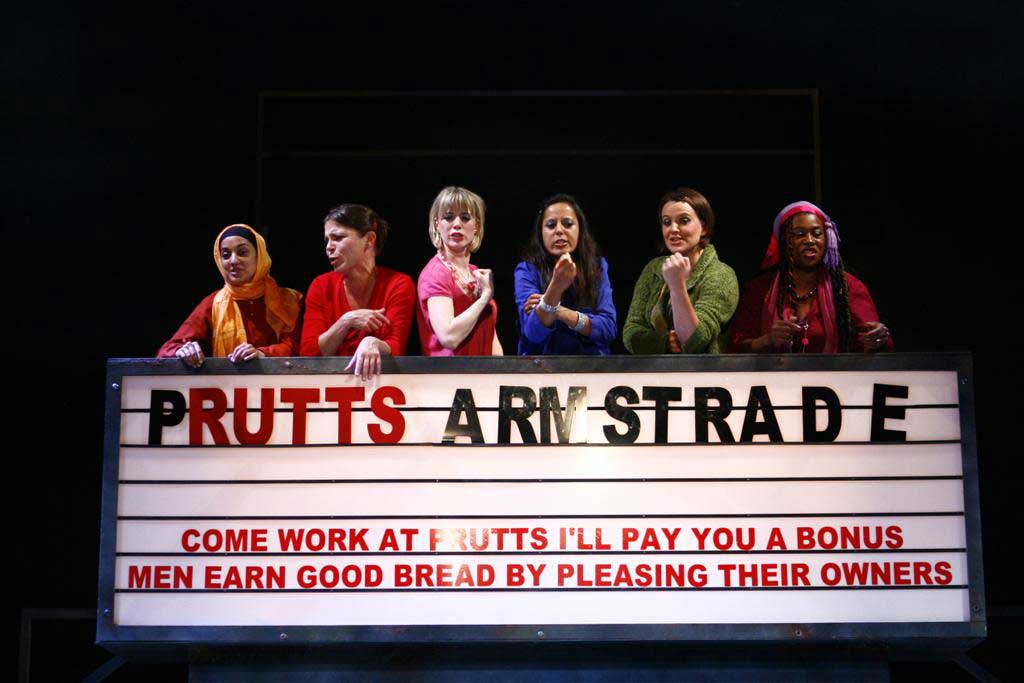 |
Plate 6 Prutt's Arms Trade.
Copyright Nobby Clark 2007.
Furnished with the facts, Lysistrata's women ascend and stiffen in their resolve to defeat the 'conman [...], slimeball [...], scumbag [...] death merchant' behind the manufacture of such weapons of mass destruction. To be honest, many in the audience had worked out the heavily-signposted truth long before this moment of on-stage realisation, but rather than revelling in the cleverness of seeing something before the play's characters, the telegraphing of the situation adds to the play's general sense that so much of this hidden aggression is going on around us that we all need to have more frequent moments of realisation concerning the harsh truths that lie behind our self-indulgent positions of global privilege.
To attempt to stop the women from disrupting the vital economic processes of arms manufacture, a collection of Formbyesque boys in blue (numbered 1,2,3 and 4) enter to a ukulele banjo ditty that ironically celebrates the 'utility' of the British Copper:
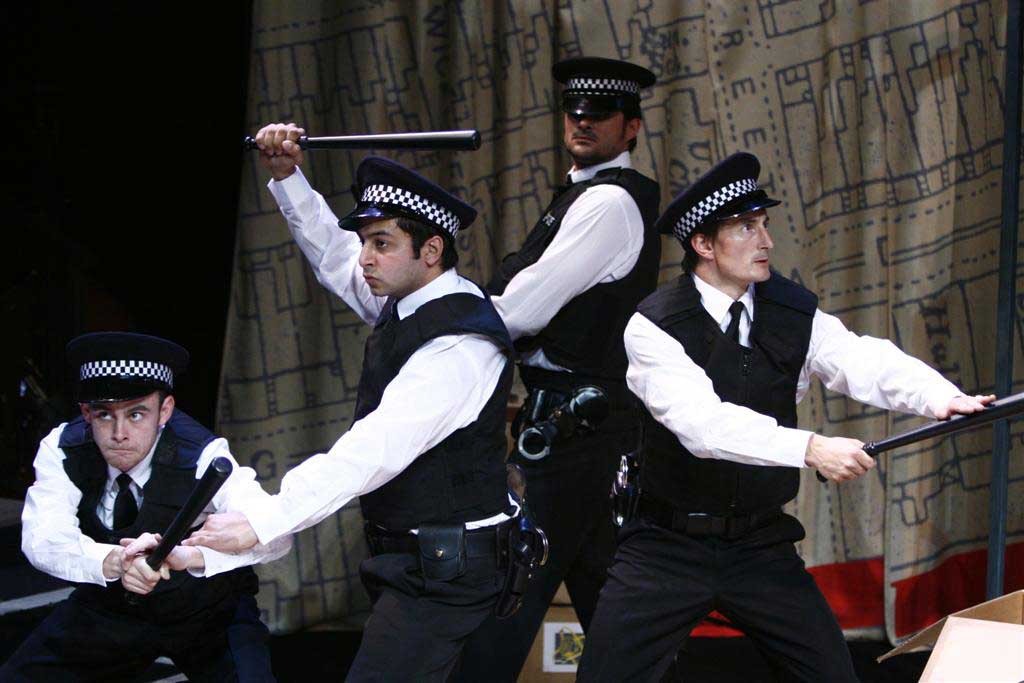 |
Plate 7 Coppers.
Copyright Nobby Clark 2007.
Evil bastards show 'em who
Suspicious types we hate them too
Crack that truncheon swing that knee
Boot 'em hard 4123
We can't stand wrong'uns having fun
So we blast them with our trusty gun
Leave them dying on the floor
Then shoot 'em again just to be sure
Oh, the trusty British Bobby
Pounds the beat and keeps the streets clean
And the crime rate is decreasing
Thanks to us
Oh, the trusty British Bobby
Pounds the beat and keeps the streets clean
And the victim is deceased sir
Thanks to us
Such reference to the shooting of Jean Charles De Menezes in London in 2005, juxtaposes Morrison's comic policemen against more gruesome state-sanctioned violence, contrasting the jovial aggression of staged comedy with that both in and behind the real acts of violence lying at the heart of Morrison's piece. The audience accordingly respond with approving laughter as Lysistrata and her women (termed 'insurgents' and 'suicide bombers' by the police) repel each officer's attempted assault by tipping pots of bodily waste onto the men below. With much phallic posturing, the police wield batons and guns. They describe women's knitting needles as 'machetes' and pots of urine as 'acid bombs' in order to justify their disproportionate, yet always unsuccessful, attacks. Moreover, police comments about both black and Asian women reveal the exactly the kind of institutionalised racism recently picked up on in the aftermath of the Stephen Lawrence Inquiry. This is another moment of uncomfortable topical allusion, dealing with as yet unresolved racial tensions; but less fraught scatological humour returns when the Bobbies finally flee for fear of falling female faeces and the first half finishes with Prutt and Lysistrata conducting a fierce debate concerning gender roles and men's complicity with war.
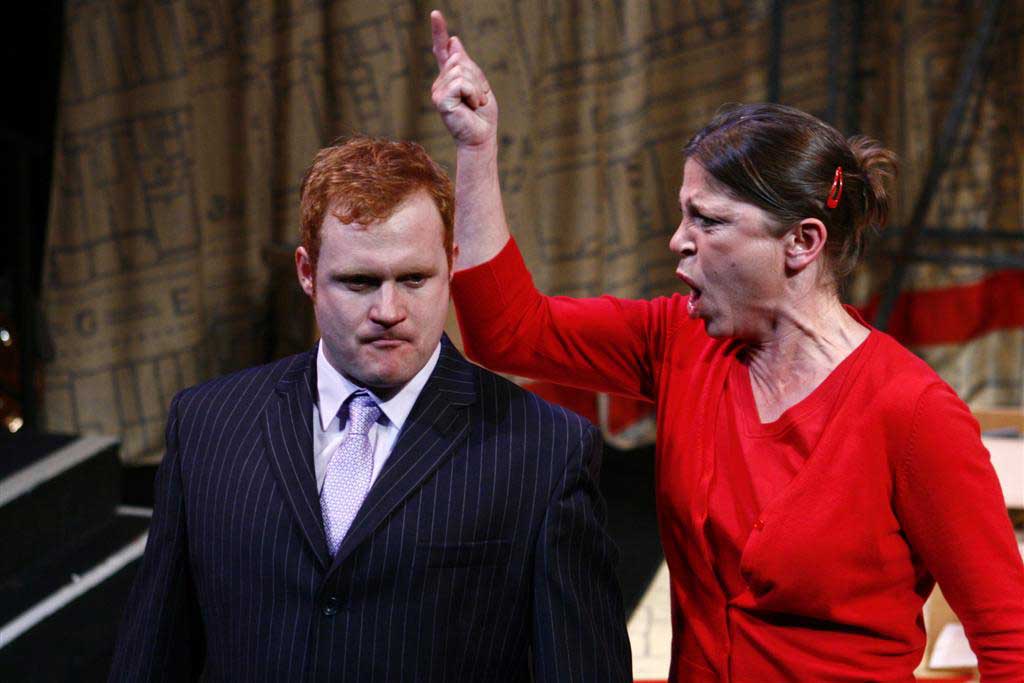 |
Plate 8 Prutt Arguing with Lysistrata.
Copyright Nobby Clark 2007.
The second half begins (at around Lysistrata 710ff), with women slyly sloping off from the occupation because they are badly in need of sex. A variety of reasons are given: worry about mothballs, a rose bush that needs pruning, one Muslim character claims to answer the call to prayer... Just as in Aristophanes, a false pregnancy is staged. This time, however, the object stuffed up the women's top is a bomb left lying around by Old Man Mars. There next follows an impressive musical number that conveys the sexual longings of both men and women (The Celibacy Blues) in which an Afro-Caribbean female character, Loretta (Flo Wilson), sings:
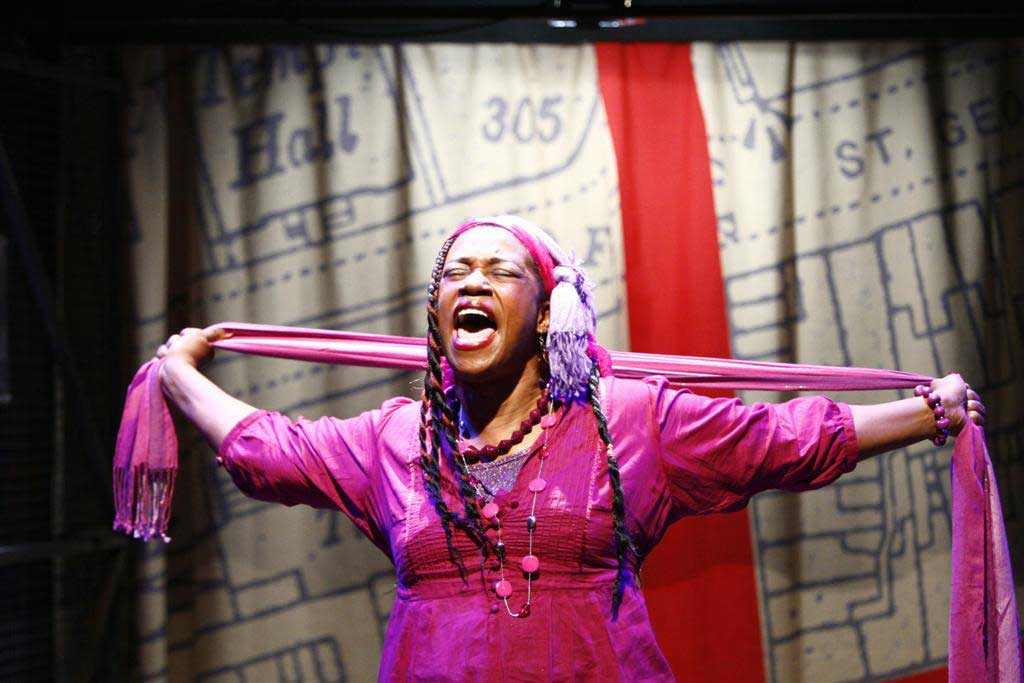 |
Plate 9 Celibacy Blues.
Copyright Nobby Clark 2007.
Got the celibacy blues, girl, pining for my loving man.
Miss the touch of him so bad, yeah, his sweet wet tongue and gentle hand.
Without my man to bring me comfort, I can't reach the Promised Land.
Baby kisses on my belly, on my buttock and my thigh,
His hairy chest against my nipple, my legs wrapped round him as we lie.
Don't need no dope or whisky, one whiff of my man gets me high.
Yes, when a woman's feeling lonely, there ain't but one known solid cure.
Only a man can bring jouissance, only a man can bring amour.
No dildo dong done ever come, man, nor do it make this girl come too.
Just wanna lie back on the pillow with my hands behind my head
Let my man make all the running till I'm clutching at the bed
When I go down and kiss him back, hon, I'll give him love he won't forget.
Got the celibacy blues, girl, pining for my loving man.
Miss the touch of him so bad, yeah, his sweet mouth and gentle hand.
I've tried so hard to keep my promise but I hate this loving ban.
Lit in dusky pinks and blues, and backed by trumpets, guitars, double bass, violin and tambourine; Wilson's sleazy New-Orleans-style lament gradually works itself into a state of ecstasy, eventually going double time (with baritone saxophone and flute added) as Loretta cries, unrequited, for her man to bring her to a state of sexual ecstasy. It is quite some spectacle to behold.
When the oracle speaking of the women's impending success is revealed as a horoscope (again from Heat magazine), the play moves into its most riotously comic phase. Having held off thus far from the use of comic phalloi, male characters now begin to enter in a state of extreme discomfort and sexual frustration. The first to do so is Amit (Chook Sibtain), who comes to enact a well-crafted Bollywood fantasy with his wife Rukmini (Seema Bowri). Sibtain's entrance is telegraphed long before he arrives on stage by means of female characters admiring glances (offstage) and their desiring descriptions of his anatomy. Thus, when the audience first get a glimpse of the three-foot-long red phallus Amit wears (made from a variety of woollen sports socks stretched tautly, like skin, over a metal-caged phallus) along with his indecorously-dangling woollen pom-pom testicles, Amit's entrance gets the hugest laugh of the night. As more and more men appear with exactly the same debilitating prostheses, the laughter only increases. By the time a black (Spartan) messenger appears as a Postman trying desperately to hide his erect member inside a donkey jacket, the audience are in fits. All the more so when the Postie opens his jacket and his phallus falls not as it should, leading other male actors to look at each other, then at him, then at the wonky phallus as they milk a moment of impromptu comedy for all it is worth.
The Postman brings news of a truce, which most of the men are keen to sign in order to end racial warfare; yet one particularly-stubborn white does not wish so to do:
DICK
It's well and good talking about a treaty
But you forget how stubborn they'll be.
When they won't even play footy, 'cos their players
Can't go ninety minutes without saying prayers,
What are the chances of them compromising?
One in a million, that's about the size of it
Despite appeals from other whites to negotiate:
WILL [white] (putting his arm round IQBAL and TYRONE [one Asian, the other Black])
Give 'em a chance – them and me are fitting twins.
We're all brothers bursting out of our skin.
The racist bigot will not give in:
DICK
Brothers! They're all as bad – Yids, Krauts. Pakis, Wops.
There's no point talking.
In the face of this hard-hitting racism, the show gets increasingly surreal. Men's penises begin to talk, often voicing opinions different to those of their owners:
DICK'S COCK
It's no use, brothers. I've tried telling
Him but he treats me like an ugly swelling,
A protuberance he's embarrassed by,
A fleshly weakness he wants to deny.
CHORUS OF COCKS
It's his brain that's feeble, not you, cock./
Stand firm./Don't give up, mate./You're hard as rock.
We'll help you turn him./ Hold your head high and be strong./
He'll soon see reason when he hears our song [...]
The male actors then move to the open traverse end of the space, standing in a blackout with their backs to the audience. When they turn round, only their phalloi are lit in a tightly-focussed corridor of open-white light and the audience suddenly notice that, with his back turned, each man has attached eyes to the glans of his prosthetic penis. Accompanied by double bass (and voiced by the actors who wear them), the stiffened cocks perform a Monty Pythonesque barber-shop burlesque, with full-on cockney accents. Openings in glans (operated by their wearers from the base of each cock's shaft), open and close like Muppet mouths as the phalloi sing:
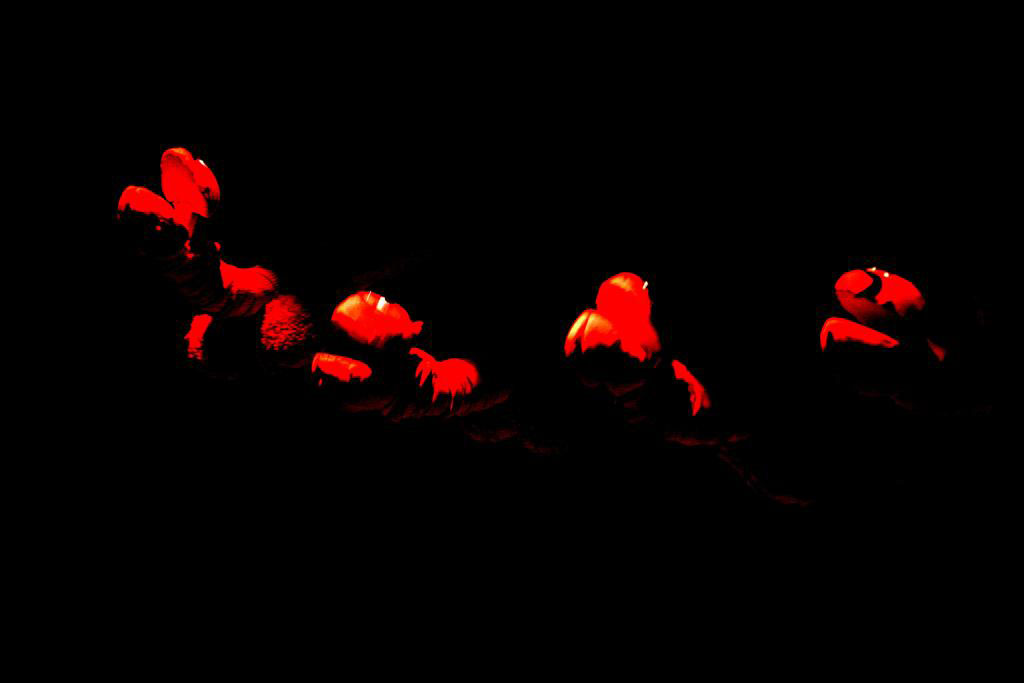 |
Plate 10 Cocks.
Copyright Nobby Clark 2007.
You're suffering from rejection
And starved of all affection
Your girl is giving nothing out but grief.
Things keep getting harder
You need to cool your ardour
But we can tell you how to find relief
The fairer sex have tumbled
But just as often grumbled
Since Cleopatra fumbled with her asp.
So since creation day
We've found another way...
The answer's always been within your grasp [...]
All you gotta do is whistle a little tune
Whistle in the morning. Whistle at Noon.
And when the evening air is heady with the scent of love's perfume...
Just pucker up and whistle a little tune.
From this joyous masturbatory absurdity the show moves into a Western-style gunfight between blacks and whites, with erect penises used as six shooters (or should that be two shooters? or indeed two hundred million shooters?). This moment of madness forms the last macho stand before Lisa and her girls break through the traverse-end cage to enact a high-octane, sex-fuelled final inducement to sign for peace. Inviting the male gaze and offering intense scopophilic (if not-as-yet sexual) gratification, female cast members, dressed like the eye candy that drapes itself over Bob Fosse's Cabaret, sport hot pants and stockings, red push-up bras (with black and white trim), open white blouses, low-cut waistcoats and bowler or top hats adorned with Remembrance Day Poppies. Carol sits astride a big bass drum that bears the words 'Lisa's Sex Strike'. She looks for all the world like Sally Bowles, draped over that chair as she slowly, very occasionally, beats her instrument provocatively and the production moves towards what looks like a climactic, sexually-provocative ending.
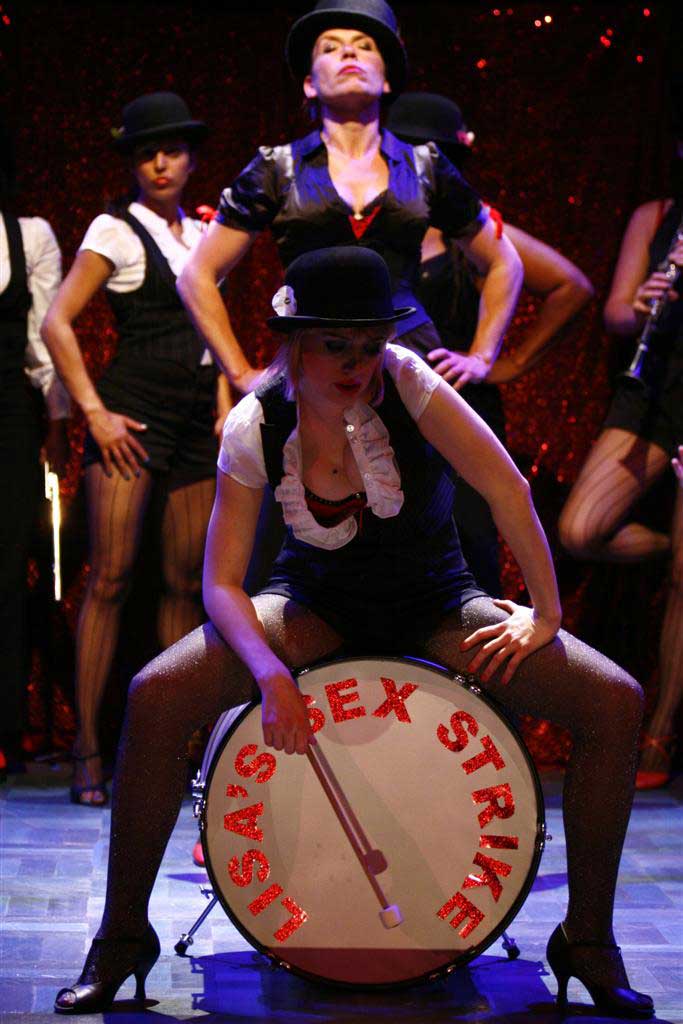 |
Plate 11 Cabaret.
Copyright Nobby Clark 2007.
Elated, the men and women pair off and dance towards a hyper-sexualised conclusion. Morrison's stage direction reads: 'the men all gradually join with the women on top of the table, DICK being the last to succumb. [There are] wild celebrations [and a] sense of ending – [the] audience thinks it's all over...'
It is not. Peace and the promise of coitus are interrupted by Prutt (Simon Holland Roberts) who enters blowing an extremely loud air horn for a distressingly long period of time until all on stage have stopped doing what they were and stand stock still, shocked. In a mark of how engaged the audience have become with what is happening on stage, as Holland Roberts takes his hand off the air horn and silence slowly returns to the stone-vaulted auditorium, a lone voice rises from the audience. It utters just one word: 'Tosser...' After a beat, the arms manufacturer ignores the heckler and performs a virtuoso diatribe of hatred in which he denies the audience their 'hippy dippy' ending. Prutt points out that, despite all the peace protests in history, war continues:
As to your leader, your Lisa, your Lysistrata,
She's not a heroine or a martyr
But a fantasist, whose so-called peace rally
Has led the lot of you down a blind alley.
As if your occupation could make a scrap
Of difference to the wider world! That's crap.
Remember what happened at Greenham Common
Back in 81, with those Peace Women?
You should ask what good their protest did,
How many minds were changed, whether the world was rid
Of a single weapon thanks to their cause.
No, the world's the same as it ever was.
And I'll tell you why: because men have fought wars
Ever since the era of dinosaurs,
And since an army without weapons can go nowhere
Someone has to supply the military hardware...
Like a stone-hearted politician urging his supposedly naive auditors to come to terms with 'the simple facts of life', Prutt declares that in the present economic system of globalised industrial capitalism, without war there is no future... the arms manufacturer's final, disruptive emergence is accordingly profoundly unsettling and, in further demonstration of their engagement with the show, several members of the audience continue to heckle him, interjecting insults and put-downs as he speaks. Prutt attempts to divide his workers against each other. He intimidates them into not signing the treaty; but the workers have finally turned against their boss and any part in his arms trade. Eventually, Holland-Roberts is engulfed in a Union-Jack fabric tube that acts as a quick change sack. He re-emerges, first in US combat dress, and is placed in a variety of moral dilemmas:
MALE CHORUS
Take him out, take him out. Now!
LISA
He's there. Can't you see him? A boy of eleven.
Just a lad - with an AK-47.
Now the gun you supplied is pointing at you
He's a child, Prutt. A child. What do you do?
CHORUS
Kill or be killed, kill or be killed, kill or be killed.
PRUTT
I don't want to die. I don't want to die.
But I can't shoot him. He's only a child.
Emerging from the quick change sack again, Prutt is dressed in a Guantánamo-style orange jumpsuit. With a black hood placed over his head, he stands with hands outstretched à la Satar Jabar in the infamous Abu Ghraib pictures. The iconic image is deployed to great theatrical effect:
MALE CHORUS
No talking. No walking. No visits. No lights.
No phone calls. No lawyers. No freedoms. No rights.
No rattling of bars. And no big ideas.
Our aim's to detain you for years and years
[...]
We don't need the charge-sheet for terrorist scum.
We don't keep a record. There isn't a file.
You don't need a lawyer. There won't be a trial.
As the performance gets more and more Agit-Prop: photocopied images of children, women and old men are held up by members of the company, who ask, in turn, if Prutt has seen:
MEN
My girl. My wife. My sister. My mother.
WOMEN
My son. My lover. My father. My brother.
Prutt sinks to his knees, exhausted. As the mourners melt away into the darkness, he confesses:
I never knew. Or if I did, I didn't care.
Now I do. Grief on grief it's too much to bear.
These penultimate sections of performance are deliberately disturbing, juxtaposing aspects of the current so-called 'War on Terror' against the generally pacifist and light-hearted tenor of the production they shock audience members and, moving entirely away from comedy to a bleak vista of humanity's crimes against itself, they create numerous moments of moral vertigo in which the laughter of much of the show seems highly inappropriate. Even the fact that we are sitting in a comfortable theatre whilst torture and the murder of innocents is going on in our names begins to seem unforgivable. Yet Northern Broadsides' play strives towards final redemption. From his last quick change, Prutt emerges in a white spangly suit and, as the cast sing repeated joyous chords of 'Hallelujah', he is given a two-and–a-half-foot-long rigid white phallus with hard shiny balls. Mama Pax encourages him to use it:
[...] let that tiny walnut, the less than zero
Shrivelled at your thigh, rise up again, a hero
Come back to life, a mighty oak or sequoia
Which climbs and soars till it bursts in flower
And explodes in a million golden seeds -
That, Mr Prutt, is what every man needs
Prutt fires the explosive charge buried inside his stage-prop phallus and its contents explode all over the stage—showering actors and audience with white streamers and silver-white glitter. As Prutt's love-juice scatters, streams and flutters, Northern Broadsides dance out their conclusion to a reprise of the cocks' song: Whistle a Little Tune.
Skilfully, the company have moved their audience from a dark and expressionistic series of political statements to a more complete rejuvenation than would otherwise have been possible. The atmosphere at curtain call is almost euphoric—even if the audience are only half-way towards the relief-giving orgasm for which everybody in the theatre is by this point yearning. At curtain down, the night is young in Halifax... yet once the necessary fun has been had, many of us will be thinking very differently about war and our world.
Note:
Muppetry of the Penis by Blake Morrison (after Aristophanes's Lysistrata)
Octagon Theatre, Bolton, UK, 6th September 2007 and National Tour
Directed by Conrad Nelson for Northern Broadsides
